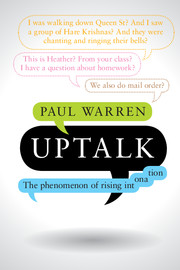Book contents
- Frontmatter
- Dedication
- Contents
- List of figures
- List of tables
- Preface
- Acknowledgements
- List of symbols and abbreviations
- 1 Introduction – why ‘uptalk’?
- 2 The forms of uptalk
- 3 The meanings and functions of uptalk
- 4 Uptalk in English varieties
- 5 Origins and spread of uptalk
- 6 Social and stylistic variation in uptalk use
- 7 Credibility killer and conversational anthrax: uptalk in the media
- 8 Perception studies of uptalk
- 9 Uptalk in other languages
- 10 Methodology in uptalk research
- 11 Summary and prospect
- References
- Index
4 - Uptalk in English varieties
Published online by Cambridge University Press: 05 December 2015
- Frontmatter
- Dedication
- Contents
- List of figures
- List of tables
- Preface
- Acknowledgements
- List of symbols and abbreviations
- 1 Introduction – why ‘uptalk’?
- 2 The forms of uptalk
- 3 The meanings and functions of uptalk
- 4 Uptalk in English varieties
- 5 Origins and spread of uptalk
- 6 Social and stylistic variation in uptalk use
- 7 Credibility killer and conversational anthrax: uptalk in the media
- 8 Perception studies of uptalk
- 9 Uptalk in other languages
- 10 Methodology in uptalk research
- 11 Summary and prospect
- References
- Index
Summary
Cruttenden (1995) notes two main geographic areas where wider use of rises has been reported than for either British Received Pronunciation or General American. These are on the one hand Urban Northern British (UNB), covering a group of northern British cities (Belfast, Derry, Glasgow, Newcastle, Liverpool, Birmingham), and on the other hand the Pacific Rim (Australia, New Zealand, California, Canada). The two areas have different characteristic rises, with the rise-plateau and rise-plateau slump patterns of UNB different in shape, distribution and function from the high-rise terminals or uptalk of the Pacific Rim (Cruttenden, 1995: 168–171). It is clear, however, that uptalk has a wider geographic range than just the Pacific Rim. In a summary of phonological features of English varieties around the world, Schneider (2004: 1126) comments that uptalk (HRT) occurs ‘fairly generally in British, American, Caribbean, Australian and New Zealand dialects and occasionally in Africa and Asia; in general, the phenomenon is assumed to be spreading globally among the young’. In this chapter, I review studies of uptalk across a range of English varieties worldwide. In terms of Kachru's (1992) classification, the discussion in this chapter will be mainly of uptalk in inner-circle varieties such as British, American, Canadian, Australian and New Zealand English. But I will also include varieties such as Indian and Hong Kong English sometimes labelled as outer-circle or extended-circle varieties and New Englishes.
It is important to remember again that discussions of uptalk, HRT, upspeak, AQI and so on may not be discussions of precisely the same phenomenon. That is, an Australian's questioning intonation may not have the same form nor the same function as an American's upspeak or a New Zealander's high-rising terminal. This difficulty is compounded by the fact that researchers based in different countries or even in different university departments in the same country may not be using a common set of terms, nor a common method of intonational analysis. What might work as a set of intonational descriptors for one variety may not work for another. While Rahilly's (1997: 110) comment that ‘the lack of an appropriate model for analysing prosody tends to beleaguer all varieties of English except RP [Received Pronunciation]’ may sound extreme (after all, the ToBI model has for instance been successfully applied to both General American and Australian Englishes), the point remains that cross-varietal comparisons can be problematic (Warren, 2005a).
- Type
- Chapter
- Information
- UptalkThe Phenomenon of Rising Intonation, pp. 69 - 96Publisher: Cambridge University PressPrint publication year: 2016



